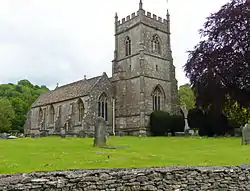Horton, Gloucestershire
Horton is a village on the Cotswold Edge, in Gloucestershire, England. It is about 2 1⁄2 miles (4.0 km) north of Chipping Sodbury. The nearest settlement is Little Sodbury, about 1 1⁄2 miles (2.4 km) away; Hawkesbury Upton and Dunkirk are both 2 1⁄2 miles (4.0 km) miles away. It is a linear settlement built on the slopes of a steep hill.[2]
| Horton | |
|---|---|
 The Grade I listed church is dedicated to St James the Elder | |
 Horton Location within Gloucestershire | |
| Population | 355 (2011)[1] |
| OS grid reference | ST726822 |
| Unitary authority | |
| Ceremonial county | |
| Region | |
| Country | England |
| Sovereign state | United Kingdom |
| Post town | BRISTOL |
| Postcode district | BS37 |
| Dialling code | 01454 |
| Police | Avon and Somerset |
| Fire | Avon |
| Ambulance | South Western |
| UK Parliament | |
The name Horton is a common one in England. It normally derives from Old English horu 'dirt' and tūn 'settlement, farm, estate', presumably meaning 'farm on muddy soil', but the historical forms of this Horton vary, including the Domesday Horedone, Hortune from 1167, and the 1291 form Heorton, the latter of which could point to Old English heort 'stag'.[3]
Horton Court is a manor house, now in the ownership of the National Trust and is a Grade I listed building. The estate is reputed to have at one time been owned by one of King Harold's sons. The oldest part of the house was built as a rectory by Robert de Beaufeu, who was rector of Horton and prebendary of Salisbury. The Norman doorways and windows have rounded arches and the roof is arch-braced and dates to the fourteenth century. It is one of the oldest houses in the country, with parts of the great hall and north wing dating from 1140, with further additions to the north wing added in the fourteenth, fifteenth and eighteenth centuries. The rest of the house was built in 1521 for Willian Knight, who was later the Bishop of Bath and Wells. The house has an L-shaped plan and is constructed of stone with a stone slate roof.[4][5]
The Anglican church of St James the Elder is also a Grade I listed building, originally built in the twelfth century and rebuilt in the fourteenth century, with alterations in the fifteenth and sixteenth centuries and restorations in 1865.[6]
References
- "Parish population 2011". Retrieved 19 March 2015.
- Concise Road Atlas of Britain. AA Publishing. 2016. p. 30. ISBN 978-0-7495-7743-8.
- Victor Watts (ed.), The Cambridge Dictionary of English Place-Names, Based on the Collections of the English Place-Name Society (Cambridge: Cambridge University Press, 2004), s.vv. HORTON Avon, HORTON COURT.
- "Horton Court, Horton". British Listed Buildings. Retrieved 29 August 2016.
- Keith Pauling. Discovering The Cotswold Way. Lulu.com. pp. 115–116. ISBN 978-1-4710-2342-2.
- "Parish Church of St James the Elder, Horton". British Listed Buildings. Retrieved 29 August 2016.
External links
![]() Media related to Horton, Gloucestershire at Wikimedia Commons
Media related to Horton, Gloucestershire at Wikimedia Commons